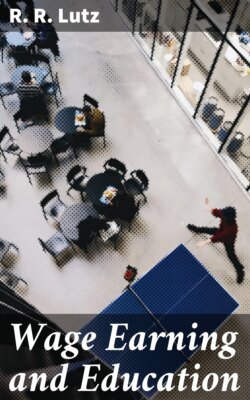Читать книгу Wage Earning and Education - R. R. Lutz - Страница 10
На сайте Литреса книга снята с продажи.
The Survey Staff and Methods of Work
ОглавлениеThe reports of the studies relating to vocational education were published in a series of eight separate monograph volumes. The names of the reports and the previous experience in educational and investigational work of each member of the Survey Staff are as follows:
"Boys and Girls in Commercial Work"—Bertha M. Stevens; teacher in elementary and secondary schools; agent of Associated Charities; secretary of Consumers' League of Ohio; director of Girls' Bureau of Cleveland; author of "Women's Work in Cleveland"; co-author of "Commercial Work and Training for Girls."
"Department Store Occupations"—Iris P. O'Leary; head of manual training department, First Pennsylvania Normal School; head of vocational work for girls and women, New Bedford Industrial School; head of girls' department, Boardman Apprentice Shops, New Haven, Conn.; special investigator of department stores for New York State Factory Investigating Commission; three years' trade experience as employer and employee; author of books on household arts and department stores; Special Assistant for Vocational Education, State Department of Public Instruction, New Jersey.
"The Garment Trades" and "Dressmaking and Millinery"—Edna Bryner; teacher in grades, high school, and state normal college; eugenic research worker New Jersey State Hospital; statistical expert in United States Bureau of Labor Investigation of women and child labor; statistical agent United States Post Office Department; Special Agent Russell Sage Foundation.
"The Building Trades," and "The Printing Trades"—Frank L. Shaw; teacher in grades and high school; principal of high school; assistant superintendent of schools; superintendent of schools; special agent United States Immigration Commission; special agent United States Census; industrial secretary North American Civic League for Immigrants; author of reports on immigration legislation.
"The Metal Trades"—R.R. Lutz; teacher in rural and graded schools; superintendent of schools; secretary of Department of Education of Porto Rico; took part in school surveys of Greenwich, Conn., Bridgeport, Conn., Springfield, Ill., Richmond, Va.; Special Agent Division of Education, Russell Sage Foundation.
"Railroad and Street Transportation"—Ralph D. Fleming; special agent and investigator for United States Immigration Commission, the Federal Census of Manufacturers, the United States Tariff Board, the Minimum Wage Commission of Massachusetts, the National Civic Federation, and the United States Commission on Industrial Relations.
The work began in April, 1915, and ended in the same month of the following year. Two members of the staff, with one stenographer and a clerk, were employed during the entire period. One member of the staff was employed 11 months, one nine months, one approximately five months, and one two months.
The field investigations consisted largely of visits to industrial establishments for the purpose of securing first-hand information as to industrial conditions and the nature and educational content of particular occupations. Over 400 visits of this kind were made by members of the Survey Staff. Many conferences were held with employers and employees with the object of securing their views as to the needs and possibilities of industrial training.
The task of tabulating and classifying the data obtained by the individual investigators in their visits to the local industrial establishments involved much time and labor. Although it was not found practicable to maintain complete uniformity in the different inquiries, the members of the staff kept in close touch with each other, so that with respect to the points of principal importance, the results of their investigations are comparable. Practically every recommendation made in the reports was discussed in conferences with school principals and with other members of the teaching force engaged in the teaching of vocational subjects.
Throughout the survey the objective held constantly in mind was the formulation of a constructive program of vocational training in the public schools. In outlining the field of inquiry a clear distinction was drawn between those kinds of general education which have a more or less indirect vocational significance, and vocational training for specific occupations in which the controlling purpose is direct preparation for wage-earning. The studies were purposely limited to this latter type of vocational training. The survey did not concern itself with manual training conducted for general educational ends, with the art work of the schools, or with courses in domestic science and household arts. These subjects in the curriculum were dealt with in different sections of the education survey, but were considered as being outside the legitimate field of the vocational survey.
